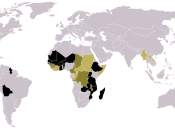The indebtedness of sub-Saharan African countries is said to be one of the greatest problems faced by them in present times. [Omole 2003:1] Not only has it led to economic stagnation of these countries and the increase in global inequality, it has further increased the number of people living in extreme poverty and reduced the ability of developing countries to have a strong political and economic foot on which to stand. The most vulnerable groups within these countries have suffered and continue to suffer, and Africa remains the poorest, least developed and most technologically backward continent in the world, even though it is abundant in raw and human resources. [Mulinge 2003:23] Many ideas have been put forward to proclaim the responsibility of this enormous debt but our main concern should lie with whether Africa can continue to survive with this overwhelming burden of external, multi-faceted debt and should debt-relief be given, can Africa remain debt-free?
Movements such as Jubilee South, CADTM, ATTAC, Human Rights Activists and many other NGO organisations across the globe have declared that debt cancellation, without 'conditionalities', is the only solution to this increasing devastating problem of poverty.
"...make sure debt relief is not conditional on health or economic reforms that are potentially harmful to health outcomes." [Moseley (Logie and Rawson) 2004:80] While this may seem like a good idea, one has take into account that there are additional factors that need to be addressed before complete debt cancellation can truly improve the lives of the populations that live in these indebted, impoverished countries over a long-term period - Africa too, has a job to do.
Debt forgiveness or cancellation is the only answer:
The enormous debt owed by developing African countries is crippling their economic growth, human development initiatives and is undermining poverty reduction - the...


